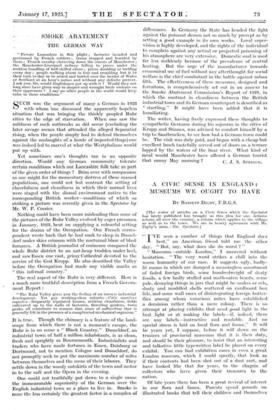SMOKE ABATEMENT •
THE GERMAN WAY " Picture Lancashire in this plight ; factories invaded and garrisoned by French soldiers ; trams stopped and boarded by them ; French cavalry clattering down the streets of Manchester ; the Manchester-Liverpool railway falling to pieces under the reckless handling of half-skilled aliens - prices doubling or trebling every day ; people walking about in fear -and trembling lest it be their turn to-day to be seized and hurled over the border of Wales or Scotland at an hour's notice and without any definite pretext. I ask you, Sir, would Englishmen put up with it ? Would they not long since have given way to despair and wrought futile violence on their oppressors ? I say no other people in the world would keep calm in these conditions."
SUCH was the argument of many a German in 1923 with whom one discussed the apparently hopeless situation that was bringing the thickly peopled Ruhr cities to the edge of starvation. When one saw the mildness of such outbreaks as did occur (excluding the later savage scenes that attended the alleged Separatist rising, when the people simply had to defend themselves against the onslaughts of a horde of imported thugs) one was indeed led to marvel at what the Westphalians would put up with.
Yet sometimes one's thoughts ran in an opposite direction.: Would any German community tolerate certain conditions which our Lancashire folk take as part of the given order of things ?. Brim over with compassion as one might for the momentary distress of these massed populations, one could not but contrast the setting of Cheerfulness and cleanliness in which their normal lives were staged with the dismal environment native to the -Corresponding British worker—conditions of which so striking a picture was recently given in the Spectator by Mr. W. P. Crozier.
Nothing could have been more misleading than some of the pictures of the Ruhr Valley evolved by eager pressmen in January, 1923, bent on supplying a colourful setting for the drama of the Occupation. One French corres- pondent wrote back that he had sunk to sleep in Dussel- dorf under skies crimson with the nocturnal blaze of blast .furnaces. A British journalist of eminence compared the whole Ruhr district to an ant-heap trodden under heel, and saw Essen one vast, grimy Cathedral devoted to the service of the God Krupp. He also described the Valley before the Occupation had made any visible marks as " this infernal country."
The real aspect of the Ruhr is very different. Here is a much more truthful description from a French Govern- ment Report : " The Ruhr Valley gives you the feeling of an intense industrial development. Yet gay working-class suburbs—Cites ouvri&es coquettes—frequently repainted houses, striking cleanliness, fields cultivated up to the walls of factories, flowering gardens, town parks, all contribute to remove that sense of suffocation that is generally felt in the presence of a complicated mechanical organism."
It is true. Though the chimney is a feature of the land- scape from which there is not a moment's escape, the Ruhr is in no sense a " Black Country." Dusseldorf, an industrial town of half a million inhabitants, is as clean, fresh and sprightly as Bournemouth. Industrialists and traders who have made fortunes in Essen, Duisburg or Dortmund, not to mention Cologne and Dusseldorf, do not promptly seek to put the maximum number of miles . between themselves and the scene of their labours. They settle down in the woody outskirts of the town and motor in to the cafe and the Opera in the evening.
One could not truthfully put down to a single cause the immeasurable superiority of the German over the English industrial town as a place to live in. Smoke is none the less certainly the greatest factor in a complex of differences. In Germany the State has headed the fight against the puissant demon not so much by precept as by setting a good example in its own works. Local super- vision is highly developed, and the rights of the individual to complain against any actual or projected poisoning of his atmosphere are very extensive. Domestic coal is used far less- recklessly because of the preValence of central heating. But the urge of the manufacturer towards economical use of fuel without any afterthought for social welfare is the chief combatant in the battle against urban filth. The effectiveness of these measures, designed and fortuitous, is comprehensively set out in an annexe to the Smoke Abatement Commission's Report of 1921, in Which the contrast in cleanliness between the British industrial town and its German counterpart is described as " startling." It might have been added that it is humiliating.
The writer, having freely expressed these thoughts to sympathetic Germans during his sojourns in the cities of Krupp and Stinnes, was advised to comfort himself by a trip to Saarbrucken, to sec how bad a German town 'could be. The visit wasduly paid, and began with a cheap but excellent lunch tastefully served out of doors on a terrace lapped by the waters of the Saar river. What kind of meal would Manchester have offered a German tourist










































 Previous page
Previous page